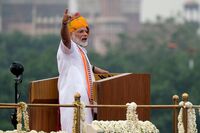China’s ambassador to the United Nations blamed India for stoking tensions with Pakistan and called on both sides to exercise restraint after a rare closed-door Security Council meeting on the situation in Kashmir that failed to produce concrete action.
The Security Council met on Friday to discuss Indian Prime Minister Narendra Modi’s decision to scrap autonomy for Kashmir, though the body was divided on how to proceed, with the U.S. and France blocking a Chinese attempt to get the 15-member body to publicly urge parties to refrain from actions that exacerbate tensions along the line of control, diplomats said.

Narendra Modi delivers a speech in New Delhi.
Photographer: T. Narayan/Bloomberg
“It’s obvious that the constitutional amendment by India has changed the status quo in Kashmir, causing tensions in the region,” Chinese Ambassador Zhang Jun told reporters after the closed-door meeting. “China is deeply concerned about the current situation and opposes any unilateral action that complicates the situation and we call upon the relevant parties to exercise restraint.”
China is a historic ally of Pakistan. Underscoring rising tensions between nuclear powers India and Pakistan over Kashmir, it was the first full Security Council meeting to discuss the disputed region since 1965.
One Western diplomat, who asked not to be identified discussing the closed meeting, said even though no decision was reached, holding the meeting helped calm tensions because it showed Pakistan that the international community is engaged on the issue.
India has called the Kashmir decision an internal matter with no bearings on its international borders with Pakistan and China. Yet Beijing issued a strongly worded statement last week questioning the impact on the mainly Buddhist region of Ladakh -- an area of strategic importance nestled between Tibet and Pakistan.
Friday’s discussion came after Pakistan’s Foreign Minister Shah Mahmood Qureshi urged the Council earlier this week to hold an urgent meeting, arguing that India’s moves pose “a threat to international peace and security, willfully undermine the internationally recognized disputed status of Jammu & Kashmir,” and violate the human rights of the Kashmiri people.
India says its decision to convert Jammu and Kashmir into two federally administered regions would usher in prosperity for the region where as many as 42,000 people, including civilians, army, police and militants have died in violence in the last three decades.
“The recent decisions taken by the government of India are intended to ensure that good governance is promoted and social economic development is enhanced,” Syed Akbaruddin, India’s ambassador the the UN, said. “We are saddened that terrorism is being fueled while language and incendiary talk of Jihad are being mentioned by people who should know better.”
No comments:
Post a Comment